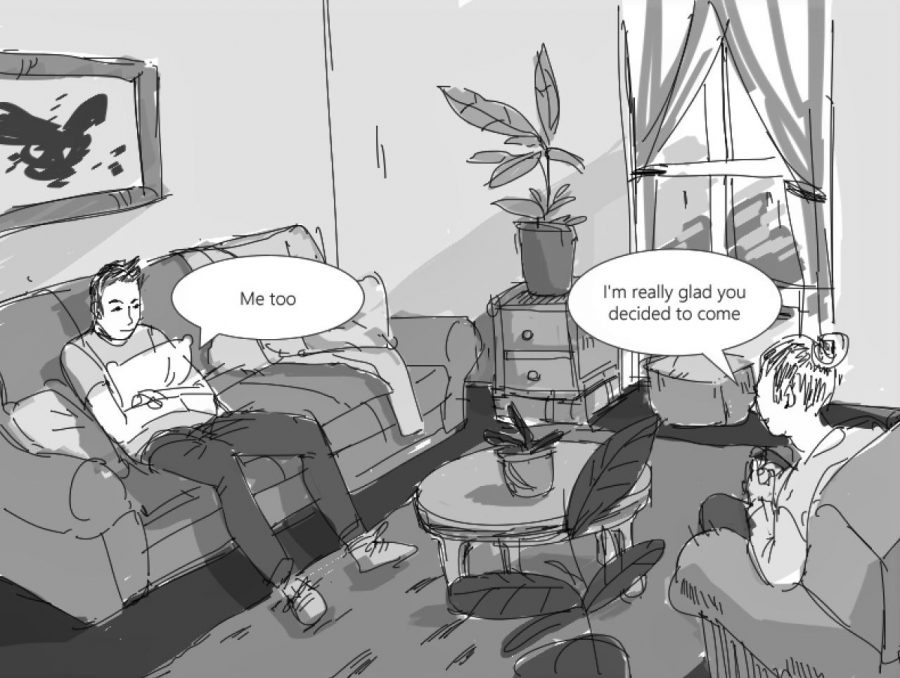“My parents were criticizing me for agreeing to do [therapy], because it seemed as if I hadn’t had my life together and that I was crazy. They made it seem as if mental health is something to be ashamed about,” an anonymous senior said.
According to the Mental Alliance on Mental Illness, about one in five adults in the U.S. suffer from mental illness. That’s almost 44 million individuals. In a society where mental illness is so prevalent, it is an incredibly stigmatized condition.
The negative connotation surrounding mental illness is evident everywhere. Search up synonyms for “mental illness” for example, and the first word that pops up is “insanity.”
The shame surrounding those who suffer from mental illness is so prevalent because people perceive them as weak. What some do not realize is that for people with illnesses such as depression, bipolar disorder and anxiety there are components in the brain that make it difficult to just “get over it.” Like any other illness, mental illness can incapacitate someone from doing routine tasks like getting out of bed or eating.
Blame is often shifted onto the individual for how they feel, causing them to believe that they deserve the effects of their illness, even though this is the opposite of the truth. Additionally, people strive for a strong sense of independence. There’s a mindset that “no matter what, I can do this on my own:” the “I do not need any help” mentality. More often than not, people fail to see the strength in asking for help.“I didn’t want to seem like I couldn’t handle what everybody else could handle,” junior Elise Mitchell said.
So what is the effect of said stigma? For people who experience mental illness and live in a society and home with others who do not believe in mental illness, it can be devastating.
Having people consistently tell you that whatever you are experiencing is in their head and is a temporary effect of teenage years can make a person feel invalidated. For someone who already has a hard time accepting their illness, being told that their problems are not real leads to heightened confusion and depression. It raises the question of “If it is all in my head, why hasn’t it stopped yet?”
As a result of the feelings of self-doubt and disgrace, people are not getting the help they need, the help they deserve. “I felt like I didn’t get the help I needed when I did, I’ve gone to very dark places when I shouldn’t have. I felt helpless,” an anonymous junior said.
We can begin to better our society by eradicating the belief that those with mental illness are less strong, and promote the importance of mental health.
It is imperative for everyone to understand the benefits of therapy. For starters, patients can talk freely in a therapy session. People are commonly apprehensive toward confiding in a family member or friend. There is a pressure of how family members or friends will perceive them after hearing what they have to say. With a therapist, there is no judgment, there is no barrier. A therapist is a professional whose entire job is dedicated to helping you. Everything someone says, unless they admit to wanting to hurt themselves or others, is confidential by law, making it a safe space. It may take a couple introductory sessions to find a therapist who connects on an emotional level, but once the right therapist is found, they can provide an abundance of methods to fight mental illness or cope with everyday stresses. People’s problems can sometimes go deeper than they think. Dissecting concerns help find the root of them and assist in identifying issues for what they really are, making the process of recovery easier.
It is also essential that people realize that therapy can be for anyone, with or without a mental illness. If there is a resource out there to better oneself, why not take it? Even if there is the possibility that what one is enduring mentally is a result of their teenage growth period, there is no benefit in going through it alone.
It is also encouraged to not let people talk down on those who struggle with mental illness. All it takes is a simple reminder to someone that using language that insults people seeking help with mental stability only further enforces the judgment of people with mental illness. Additionally, spreading awareness of various mental illnesses and ways to go about them via social media helps stagnate the judgment toward said illnesses, making people less afraid to open up about their problems.
It is time to step out of the old-school outlook on mental health, and start taking it seriously. We cannot keep brushing off the health of something that ultimately determines how we live our lives. People are to not be put to blame for how their mind functions. Struggling to stay happy or anxiety-free is not a sign of fragility. No one should be perceived weak for taking care of themselves.
Mental health is equal in significance to physical health. This can be understood by a simple yet commonly-used analogy. Say someone suspected they had the strep virus and wanted to see a doctor to diagnose and treat it. No one’s reaction to this would be “Wow, this person is weak for wanting to treat their virus.” But say someone is seeking a therapist’s help due to their ongoing struggle with depression: the response of “Just buck up and deal with it” or “you’re a teenager, you’ll grow out of it” is commonly heard. If those responses wouldn’t be said to someone with a physical ailment, then why would they be said to someone who is facing an illness that has the power to do just as much if not more harm?
If you or someone you know is experiencing mental anguish, get help. If people do not take your problems into consideration, then find people who do. What’s most important is that if you think you need help, extreme or not, you get it. It’s not your peers’ job to tell you what is and what is not real about what you are going through. Do not hold off getting help. It is important to reflect on how long you’ve been dealing with your problems, and realize that at a certain point, it is okay to ask for assistance. Even if your issues have not been affecting you for long, take control of them before they become a constant struggle. Improvement is a process but it is not impossible. If you do not have access to therapists, there are school counselors and hotlines ready to talk, such as CONTACT Helpline at (717)394-2000, Samaritan hotline at (212) 673-3000 or the Crisis Call Center (800) 273-8255.
“Before, I thought that I didn’t have anybody to talk to about my problems and even if I did, it felt as if I couldn’t do anything about them. Now I finally have somebody, and I know why I’m going through these things and it’s not just all speculation. I never thought that I would be in this place in my life right now,” the same anonymous senior said.
Kristina Tsakos
Staff Writer
















